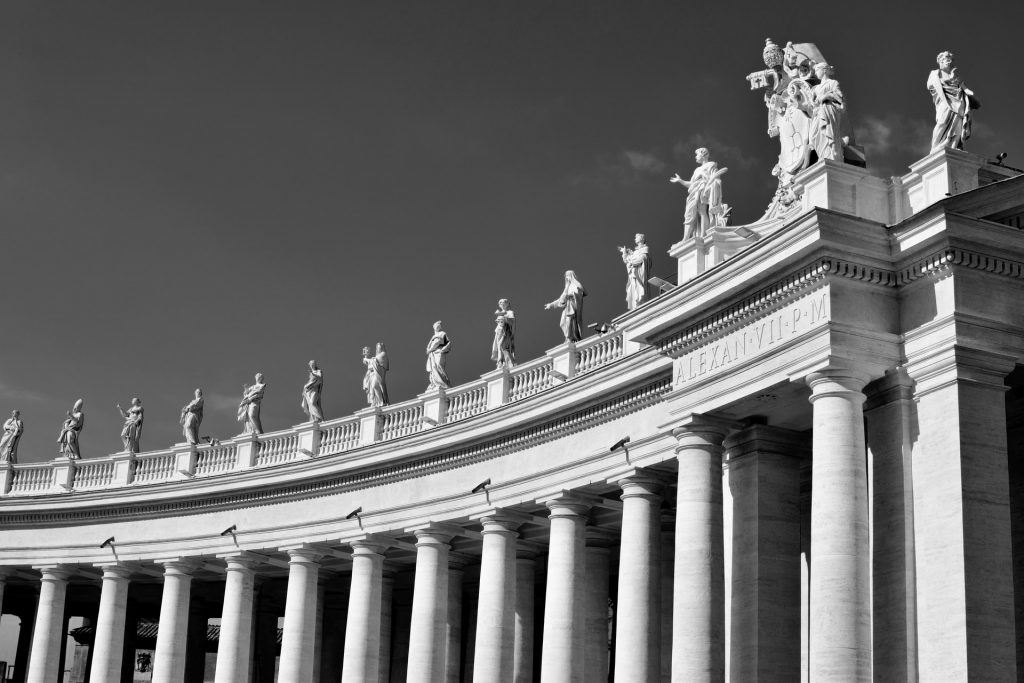
Published November 10, 2020
The long awaited McCarrick Report – or to give it its full, gloriously bureaucratic title, the Report of the Holy See’s Institutional Knowledge and Decision-Making Related to Former Cardinal Theodore Edgar McCarrick (1930 – 2017) – contains no smoking gun that explains McCarrick’s rise through the hierarchy and his gaudy, globe-trotting, post-retirement career. Nor does it contain any evidence that, in climbing the ecclesiastical greasy pole, Theodore McCarrick bribed anyone. Some will undoubtedly conclude from this that the two-year long probe led by the Holy See’s Secretariat of State is another Vatican exercise in damage control.
But the vast amount of documentation supporting the report, and even the lengthy period of its preparation, tell against that suspicion, however reasonable it might seem in light of other Vatican scandals. Moreover, if it’s read carefully and without preconceptions, the McCarrick Report is a lengthy confession of massive institutional system failure, in which a dysfunctional clerical culture played the dominant role. That may be a less satisfying “answer” to the puzzle of Theodore McCarrick than a dramatic, documented revelation of papal perfidy, or evidence of a different kind of financial scandal – the de facto purchase of a cardinalate – at the higher altitudes of the Roman Curia. But forty years of experience tells me that the system-failure explanation is likely to be true.
“Clericalism” is such a punching bag in the Church today that it’s important to define the term carefully.
By “clerical culture” I mean a culture in which the sacramental and natural fraternity of priests and bishops is debased into a caste system in which the protection of the caste and the maintenance of its superior status in the Church is the prime imperative. In such a caste system, the lower clerical castes do not question or challenge the upper clerical castes, while the upper castes enforce caste discipline. In this sense of the term, Theodore McCarrick (for all his legendary, hail-fellow-well-met bonhomie) was as “clerical” as clerical gets. He was a product of the clerical caste system; he understood its mores and mechanisms; and for decades he used it to cover his depredations and advance his career.
He was not without skills; he was an intelligent man and a gifted linguist who worked at a ferocious pace. But he was also a narcissistic predator and pathological liar whose Uncle Ted demeanor could mask his ferocious ambition, his relentless self-promotion and sycophancy to superiors, and, of course, his depredations and abuse of lower members of the caste or caste-aspirants. He was a past master at gaining the trust of others, including Pope John Paul II, and then betraying that trust.
The clerical caste system that McCarrick successfully gamed for decades was dysfunctional in many ways, and one of its dysfunctions was the way in which it warped the Church’s decision-making process in the selection of senior leadership. The McCarrick Report reaffirms that, while there were many rumors of McCarrick’s misbehavior (and not only at the infamous beach house), there was no hard evidence of his depredations until he was at retirement age, and there was no charge of his having abused a minor until 2017.
That is not altogether reassuring, however, because the rumors were out there and nothing was done to investigate them thoroughly until it was far too late. (Anyone in a prominent position in the Church who claims never to have heard those rumors is not to be taken seriously.) The report does indicate that Cardinal John O’Connor of New York thought the rumors sufficiently troubling that he raised cautions about McCarrick’s promotion from Newark to a traditional cardinalatial see: cautions that Pope John Paul II originally accepted. But then McCarrick, a practiced and persuasive prevaricator, swore in a duplicitous letter to John Paul II’s secretary that none of it was true. And John Paul believed him – perhaps influenced by the incomplete information the Holy See had received from three American bishops asked to look into the McCarrick rumors after O’Connor had raised his concerns; perhaps influenced as well by his experience of the Polish secret police using charges of sexual impropriety to impugn priests and bishops . The suggestion in some quarters that John Paul II and his closest associates somehow knew about McCarrick’s wickedness and proceeded with his promotion anyway is falsified and rebutted by the report, as it should be. Even brilliant and holy men – even saints – can be deceived.
McCarrick’s appointment to Washington and his red hat followed, but the basic damage had been done long before John Paul II was deceived. The damage had been done because, throughout his pre-Washington career and indeed before his appointment as auxiliary bishop of New York, the clerical caste system had protected him, such that his skills and talents were visible, not his duplicities and perversions. That was system failure.
Another manifestation of system failure was evident in what the report describes as the fruitless attempts by Benedict XVI and his associates to shut down McCarrick’s globetrotting after his retirement. The McCarrick Report makes clear that this was the Pope’s will and intention. But neither the will nor the intention were carried out and given effect by the relevant subordinates: in part, one can only assume, because, prior to the very recent past, cardinals occupied a virtually impregnable position in the Catholic clerical caste system.
In brief, Theodore McCarrick’s career from his appointment as auxiliary bishop of New York until his retirement years as archbishop emeritus of Washington was a massive example of system failure in the leadership culture of the Catholic Church. That failure, in turn, reflected the dysfunctionality of the then-dominant clerical caste system, the mores of which served to protect a predator like McCarrick from the consequences of his predations. Those serious about genuine, evangelically-oriented Catholic reform, rather than in score-settling or point-scoring in the internal Catholic culture wars, will thus focus their post-report attention on ensuring that the protective measures that have been put in place in the Church since the Long Lent of 2002 function properly, so that there are no repetitions of the tawdry tale of Theodore McCarrick.
As I suggest in The Next Pope: The Office of Peter and a Church in Mission, dismantling what remains of a clerical caste system that remains entrenched in parts of the world Church (notably Latin America and Poland) should be a priority task for the next pontificate. Important steps have been taken in reforming the formation of priests and the selection of bishops by John Paul II, Benedict XVI, and Francis. Those first steps must be completed be a further reform of seminaries, such that a man reaches the threshold of priestly ordination understanding that he is embarking on a challenging and quite probably difficult vocation as a missionary, not on a privileged career. Those beginning steps must be completed by a reform of the process by which potential bishops are identified. That reform should include the input of knowledgeable, shrewd, and discrete lay men and women; and in that process of identifying the bishops of the future, it must be made clear to priests that complete honesty is expected of them in evaluating a brother priest’s fitness for the episcopate.
Dismantling the clerical caste system is going to be particularly demanding for bishops. To guard against future McCarricks, bishops must insist that their priests exercise fraternal correction with each other when necessary, drawing the bishop into the process as necessary. And the bishops must commit to practicing fraternal correction with each other – a virtuous habit of the bishops of the patristic Church that the 21st-century episcopate most reclaim. Theodore McCarrick counted on the members of the episcopal club not to break the club rules. The path forward lies in dismantling those rules and consigning them to oblivion, along with the rest of the clerical caste system.
Priests and bishops need and deserve the support that comes from a sacramental fraternity. No serious lay Catholic will begrudge our pastors that. The clerical caste system, however, is a bogus form of fraternity. It warps the sacramental bonds that join priests to each other, priests to their bishop, and bishops to brother bishops. Dismantling that system is an evangelical imperative.
One final note: the extensive documentation in the McCarrick Report should put paid to the mantra that has been chanted since McCarrick’s 2018 downfall: Everyone knew. That is simply not true. Not only did “everyone” not know; no one knew with certainty about McCarrick’s serial predations at the various key points at which he ascended the ranks of the hierarchy. The report illustrates in detail a fact already known, i.e., that there were multiple rumors about McCarrick’s behavior. That those rumors were not more thoroughly investigated is a prime example of the system failure evident in this entire affair. But “everyone” did not know, and those who continue to insist otherwise are either ignorant or agenda-driven.
The eternal paradox of the Church, of which Christ himself warned us in Matthew 13:24-30, is that weeds and wheat, grave sinners and noble saints, co-exist and may even work together. That ought not diminish the shame Catholics will feel over the McCarrick affair, not should it preclude our praying for this man’s eventual repentance and conversion. By the same token, the sad fact of the weeds ought not diminish our gratitude for the wheat, and for the ways in which the wheat nourishes us.
George Weigel is Distinguished Senior Fellow of Washington’s Ethics and Public Policy Center, where he holds the William E. Simon Chair in Catholic Studies.











